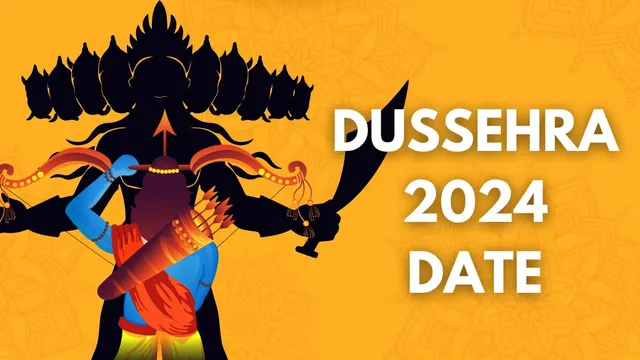- By Kashish Rai
- Wed, 09 Oct 2024 02:21 PM (IST)
- Source:JND
Dussehra 2024 Date: Dussehra, also known as Vijayadashami, holds profound significance rooted in the Ramayana legend. Marking the triumph of good over evil, it commemorates Lord Rama's defeat of the ten-headed demon Ravana, symbolizing the destruction of ten evil forces. Derived from Sanskrit, "Dussehra" means "annihilating ten evil faces." This festival concludes the nine-day Navratri celebrations, coinciding with Goddess Durga's victory over Mahishasur. As the eighth avatar of Lord Vishnu, Rama's conquest represents the culmination of righteousness and justice. Dussehra celebrates the victory of light over darkness, reaffirming the eternal triumph of good over evil, and is a pivotal event in Hindu mythology, observed with great fervour and reverence.
Check out the date, time, significance and rituals to celebrate Vijayadashami.
Dussehra 2024 Date: 12 Or 13 October, When To Celebrate Vijayadashami?
This year, Dussehra will be celebrated on 12th October 2024.
- Dashami Tithi Begins - 10:58 AM, 12th October 2024
- Dashami Tithi Ends - 09:08 AM, 13th October 2024
Dussehra 2024 Date: Shubh Muhurat
- Shravana Nakshatra Begins - 05:25 AM, 12th October 2024
- Shravana Nakshatra Ends - 04:27 AM, 13th October 2024
- Aparahna Puja Time - 01:17 PM to 03:35 PM
- Vijay Muhurat - 02:03 PM to 02:49 PM

Dussehra celebrates Lord Rama's victory over Ravana, symbolising good's triumph over evil, righteousness, and the destruction of darkness and negativity. (Image Source: Canva)
Dussehra 2024 Date: Significance
Dussehra, or Vijayadashami, holds immense significance in Hinduism, commemorating Lord Rama's triumphant victory over Ravana, symbolizing the conquest of good over evil. This festival marks the culmination of the nine-day Navratri celebrations, where Goddess Durga's victory over Mahishasur is also revered. The day signifies the destruction of ego, evil forces, and darkness, reaffirming the eternal triumph of righteousness and justice.
In Hinduism, Dussehra represents spiritual awakening and renewal. It reminds devotees of the importance of adhering to dharma (righteousness) and abandoning adharma (unrighteousness). The festival inspires individuals to reflect on their inner struggles, conquering negative tendencies, and embracing virtuous qualities. By celebrating Dussehra, Hindus reaffirm their commitment to spiritual growth, seeking divine guidance, and emulating the exemplary values of Lord Rama and Goddess Durga. This joyous occasion fosters unity, harmony, and spiritual rejuvenation among devotees, solidifying its significance in Hindu culture and tradition.
Dussehra 2024 Date: Rituals
Dussehra celebrations vary across India, reflecting regional diversity. In northern and western states, the festival honours Lord Rama's victory over Ravana, showcased through Ramlila performances, dramas, and musical plays based on the Ramcharitmanas. Enormous effigies of Ravana are burnt, symbolising the triumph of good over evil. These events take place twenty days before Diwali, attracting large crowds.
In eastern India, particularly Kolkata, Dussehra coincides with the culmination of Durga Puja, a significant Bengali festival. In contrast, southern India observes the nine-day Navratri with Golu, a display of gods and dolls, accompanied by sweet preparations. Regional traditions add unique flavours to Dussehra celebrations.
Ravan Dahan is a prominent attraction in many areas, featuring towering effigies of Ravana, Kumbhakaran, and Meghnad being set ablaze, often between 5 pm and 7 pm. Fireworks, family gatherings, and vibrant fairs/exhibitions complement the celebrations. Astrological rituals and tips are also followed to make Dussehra more auspicious. This diverse tapestry of traditions showcases India's rich cultural heritage, underscoring the universal theme of good's triumph over evil.
(Disclaimer: This is based on general public information. Jagran English does not confirm its veracity. Before adopting any measures, consult an expert in the relevant field.)

